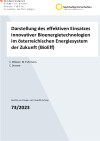Suchergebnisse
Berichte aus Energie- und Umweltforschung 2b/1996 Neuorientierung der Wärmeversorgung des Bezirks Budweis - deutsche Langfassung

Grobanalyse der Wärmeversorgung zur Entwicklung modellhafter Ansätze für eine regional- und energiepolitische Neuorientierung der Wärmeversorgung
Berichte aus Energie- und Umweltforschung 2a/1996 Neuorientierung der Wärmeversorgung des Bezirks Budweis - Deutsche Kurzfassung

Grobanalyse der Wärmeversorgung zur Entwicklung modellhafter Ansätze für eine regional- und energiepolitische Neuorientierung der Wärmeversorgung
Verbreitung Von Biomasse Kleinanlagen In Österreich

Neue Entwicklungen Brennstoffversorgung mit Biomasse-Pellets
Forschungsforum
3/1998
Herausgeber: BMVIT
Deutsch, 6 Seiten
Downloads zur Publikation
Berichte aus Energie- und Umweltforschung 12b/1997Erforschung der Verwendungsmöglichkeiten von Aschen aus Hackgut und Rindenfeuerungen - Anhang

Anhang zum Bericht aus Energie- und Umweltforschung 12a/1997
Berichte aus Energie- und Umweltforschung 10/1997 Verbrennungsgas-Kondensationsanlagen bei Biomasse-Fernwärmeversorgungsanlagen am Beispiel Pfarrwerfen

Beurteilung einer Kondensationsanlage in bezug auf technische Funktion, Wirtschaftlichkeit und Einfluss auf die Emissionen
Berichte aus Energie- und Umweltforschung 12a/1997Erforschung der Verwendungsmöglichkeiten von Aschen aus Hackgut und Rindenfeuerungen

Holzasche als Sekundärrohstoff mit dünge- und bodenverbessernder Wirkung
Darstellung des effektiven Einsatzes innovativer Bioenergietechnologien im österreichischen Energiesystem der Zukunft (BioEff)

Die Studie zeigt Möglichkeiten und Strategien hinsichtlich des effektiven Einsatzes von innovativen Bioenergietechnologien in Österreich.
Schriftenreihe
73/2023
C. Dißauer, M. Fuhrmann, C. Strasser
Herausgeber: BMK
Deutsch, 112 Seiten
Downloads zur Publikation
Berichte aus Energie- und Umweltforschung 2/1999 Biomassebewirtschaftungskonzepte auf Basis einer Nutzenoptimierung

Ermittlung regional optimaler Biomassenutzungswege und Abschätzung ungenutzter Potentiale
IEA Bioenergy Task 40: Deployment of biobased value chains (Working period 2022 - 2024)
Bioenergy Task 40 traditionally focused on international trade and supply chains of biomass for bioenergy. Starting in 2018, the systems view was broadened, also to better meet Austrian requirements. The supply chain focus was maintained, but with a broader premise: The establishment of bio-based value chains for a sustainable and fair bioeconomy.
Berichte aus Energie- und Umweltforschung 15/2002 Österreichische Beteiligung am Bioenergieprogramm der IEA 1998 - 2000

Berichte aus Energie- und Umweltforschung 22/2002 Österreichisches Energieforschungs und -technologiekonzept

Ein Orientierungsrahmen für die energiebezogene Forschung und Technologie in Österreich
SUPOSS - Sustainable Power Supply for Supermarkets and Surroundings
Developing technical and business concepts and strategies for a sustainable power supply of supermarkets and local consumers - supply of heat, electric power and cooling energy on the basis of solar energy and solid biomass.
SUPOSS - Sustainable Power Supply for Supermarkets and Surroundings
Entwicklung von technischen und kommerziellen Konzepten und Strategien für eine nachhaltige Energieversorgung von Filialen des Lebensmittelhandels und angrenzender Verbraucher (Industrie & Gewerbe, Haushalte) mit Wärme, Strom und Kälte auf Basis der Energieträger Sonne und feste Biomasse.
Berichte aus Energie- und Umweltforschung 11/2005 Energie - Forschung, Entwicklung: Ausgaben des Bundes, der Länder und der Industrie in Österreich, Erhebung 2003

Jährliche Erfassung aller in Österreich durchgeführten Forschungs- und Entwicklungsprojekte im Energiebereich.
Berichte aus Energie- und Umweltforschung 5a/1996 15 Jahre Biomasse Nahwärmenetze in Österreich

Bisherige Entwicklungen - Neue Herausforderungen
Berichte aus Energie- und Umweltforschung 5b/1996 15 Jahre Biomasse Nahwärmenetze in Österreich - Kurzfassung

Bisherige Entwicklungen - Neue Herausforderungen
Produktion alternativer Treibstoffe, Wärme, Strom & nichtenergetische Produkte - Optimierung der Gesamtenergiebilanz sowie der Materialflüsse
Produktion von Bioethanol in Bruck/Leitha im Umfeld der Produktion von Wärme, Strom und verwertbarer Reststoffe aus Biomasse, wobei die Abwärme- und Niedertemperatur¬wärmenutzung und die Stoffstromführung (Rohstoffe und Produkte) mittels eines neu entwickelten Simulationstools optimiert werden.
Innovative Nutzung Österreichischer Ofenbautechnologie Für Eine Nachhaltige Entwicklung

Kachelöfen in Österreich - Lehmöfen in Zimbabwe
Forschungsforum
2/2000
Herausgeber: BMVIT
Deutsch, 6 Seiten
Downloads zur Publikation
Reduktion fossiler Energieverbräuche durch Prozessoptimierung mit Hilfe der Simulationsbetrachtung
Musterbeispiel eines Polygenerationszentrums auf Basis Holz.
Berichte aus Energie- und Umweltforschung 13/1997 System- und pH-Wert-abhängige Schwermetalllöslichkeit im Kondensatwasser von Biomassefernheizwerken

Untersuchung des Systems Schlamm - Kondensat, der dadurch bedingten Emissionen sowie der Entsorgungsmöglichkeiten
